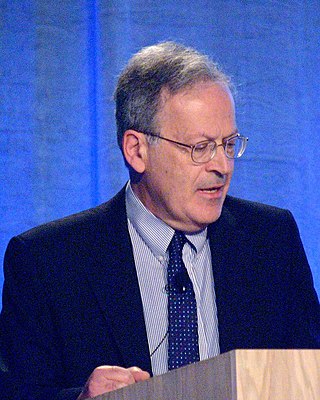
Gregory John Chaitin is an Argentine-American mathematician and computer scientist. Beginning in the late 1960s, Chaitin made contributions to algorithmic information theory and metamathematics, in particular a computer-theoretic result equivalent to Gödel's incompleteness theorem. He is considered to be one of the founders of what is today known as algorithmic complexity together with Andrei Kolmogorov and Ray Solomonoff. Along with the works of e.g. Solomonoff, Kolmogorov, Martin-Löf, and Leonid Levin, algorithmic information theory became a foundational part of theoretical computer science, information theory, and mathematical logic. It is a common subject in several computer science curricula. Besides computer scientists, Chaitin's work draws attention of many philosophers and mathematicians to fundamental problems in mathematical creativity and digital philosophy.

Stephen Arthur Cook is an American-Canadian computer scientist and mathematician who has made significant contributions to the fields of complexity theory and proof complexity. He is a university professor emeritus at the University of Toronto, Department of Computer Science and Department of Mathematics.
Computer science is the study of the theoretical foundations of information and computation and their implementation and application in computer systems. One well known subject classification system for computer science is the ACM Computing Classification System devised by the Association for Computing Machinery.

Richard Manning Karp is an American computer scientist and computational theorist at the University of California, Berkeley. He is most notable for his research in the theory of algorithms, for which he received a Turing Award in 1985, The Benjamin Franklin Medal in Computer and Cognitive Science in 2004, and the Kyoto Prize in 2008.

Theoretical computer science (TCS) is a subset of general computer science and mathematics that focuses on mathematical aspects of computer science such as the theory of computation, formal language theory, the lambda calculus and type theory.
Computational science, also known as scientific computing, technical computing or scientific computation (SC), is a division of science that uses advanced computing capabilities to understand and solve complex physical problems. This includes

Nitin Saxena is an Indian scientist in mathematics and theoretical computer science. His research focuses on computational complexity.

Friedrich Ludwig "Fritz" Bauer was a German pioneer of computer science and professor at the Technical University of Munich.

Leslie Gabriel Valiant is a British American computer scientist and computational theorist. He was born to a chemical engineer father and a translator mother. He is currently the T. Jefferson Coolidge Professor of Computer Science and Applied Mathematics at Harvard University. Valiant was awarded the Turing Award in 2010, having been described by the A.C.M. as a heroic figure in theoretical computer science and a role model for his courage and creativity in addressing some of the deepest unsolved problems in science; in particular for his "striking combination of depth and breadth".

The Gottfried Wilhelm Leibniz Prize, or Leibniz Prize, is awarded by the German Research Foundation to "exceptional scientists and academics for their outstanding achievements in the field of research". Since 1986, up to ten prizes have been awarded annually to individuals or research groups working at a research institution in Germany or at a German research institution abroad. It is considered the most important research award in Germany.

Kurt Mehlhorn is a German theoretical computer scientist. He has been a vice president of the Max Planck Society and is director of the Max Planck Institute for Computer Science.

Yuri Gurevich, Professor Emeritus at the University of Michigan, is an American computer scientist and mathematician and the inventor of abstract state machines.

Susanne Albers is a German theoretical computer scientist and professor of computer science at the Department of Informatics of the Technical University of Munich. She is a recipient of the Otto Hahn Medal and the Leibniz Prize.

Constantinos Daskalakis is a Greek theoretical computer scientist. He is a professor at MIT's Electrical Engineering and Computer Science department and a member of the MIT Computer Science and Artificial Intelligence Laboratory. He was awarded the Rolf Nevanlinna Prize and the Grace Murray Hopper Award in 2018.

Reinhard Wilhelm is a German computer scientist.
Emmerich (Emo) Welzl is a computer scientist known for his research in computational geometry. He is a professor in the Institute for Theoretical Computer Science at ETH Zurich in Switzerland.

Alan Stuart Edelman is an American mathematician and computer scientist. He is a professor of applied mathematics at the Massachusetts Institute of Technology (MIT) and a Principal Investigator at the MIT Computer Science and Artificial Intelligence Laboratory (CSAIL) where he leads a group in applied computing. In 2004, he founded a business called Interactive Supercomputing which was later acquired by Microsoft. Edelman is a fellow of American Mathematical Society (AMS), Society for Industrial and Applied Mathematics (SIAM), Institute of Electrical and Electronics Engineers (IEEE), and Association for Computing Machinery (ACM), for his contributions in numerical linear algebra, computational science, parallel computing, and random matrix theory. He is one of the cocreators of the technical programming language Julia.
Daniel Mier Gusfield is an American computer scientist, Distinguished Professor of Computer Science at the University of California, Davis. Gusfield is known for his research in combinatorial optimization and computational biology.

The TUM School of Computation, Information and Technology (CIT) is a school of the Technical University of Munich, established in 2022 by the merger of three former departments. As of 2022, it is structured into the Department of Mathematics, the Department of Computer Engineering, the Department of Computer Science, and the Department of Electrical Engineering.














